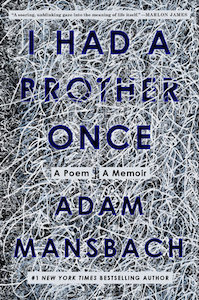
On the Bottomless Well of Grief After a Brother’s Death
From Adam Mansbach’s Memoir in Verse, I Had a Brother Once
i came to think of my grief as
bottomless, because nothing
i threw down it made a sound.
it could not be filled so instead
i found some plywood &
walled it off the way one might
a treacherous system of caverns,
scrawled a warning sign & nailed
that up as well. some days i pulled
everything down & peered
over the edge just long enough
to feel the fear of falling that is
really a fear of jumping, &
others i walked by without
a wayward glace. i knew
better than to call this healing,
or disparage it as anything
short of tremendous progress.
the decision to look or
not look, feel or not feel,
took its place among
the rituals of my day,
the espresso & the gym, the
desk & chair, the escalating
fights & bitterness, the plotting
of escape routes, putting
the toddler down for her nap,
not calling my parents.
time is longer than rope but
both can strangle you or
knot themselves beneath
your feet & implore you
to climb.
*
we hardly speak of david
now. for years my mother
would erupt in tears if
anyone mentioned his
name, even her, so instead
he hovers in the periphery,
the space between words,
the rush to fill silences
however possible. when
we do talk about him it is
innocuous, incidental, my
dad recounting a museum
he took us to when we were
kids, never his death, never
the instructions he left us
about how to read his life.
for years i was my brother’s
translator, the only one who
understood a word he said.
he threw tantrums because
he could not make clear what
he wanted, usually a spider-man
chewable vitamin. my parents
saw some vulnerability in him,
or else created it. he learned
to speak late & was not a
jailhouse lawyer when he did.
his intelligence clustered in
an unfamiliar quadrant,
was not fierce & literary
but curious, methodical, &
this was foreign, hard
to see at first. our schtick
was words, puns, opinions
legal & otherwise, we
did not suspend judgment
or embrace the scientific
method. we were generations
deep in trying to figure out
what to make of the strange
new freedom to do something
besides study the talmud all
fucking day but had not really
ventured very far afield.
by the time the realization
hit that david was maybe
the smartest of us all,
the odds had been set.
he had been handicapped.
i am not saying any
of this is a reason for
anything, just wondering
what it must have felt like.
_________________________________________________________

From the book I HAD A BROTHER ONCE by Adam Mansbach. Copyright © 2021 by Giants of Science, Inc. Published by One World, an imprint of Random House, a division of Penguin Random House LLC. Audio excerpted courtesy Penguin Random House Audio from I Had a Brother Once by Adam Mansbach, read by the author.
Adam Mansbach
Adam Mansbach is the author of the #1 New York Times bestseller Go the F**k to Sleep, the novels Rage Is Back, Angry Black White Boy, and The End of the Jews (winner of the California Book Award), and a dozen other books, most recently the bestselling A Field Guide to the Jewish People, co-written with Dave Barry and Alan Zweibel, and his memoir in verse, I Had a Brother Once. Mansbach wrote the award-winning screenplay for the Netflix Original Barry, and his next feature film, Super High, starring Andy Samberg, Craig Robinson, and Common, is forthcoming from New Line. His work has appeared in The New Yorker, New York Times Book Review, Esquire, The Believer, The Guardian, and on National Public Radio’s This American Life, The Moth, and All Things Considered.



















